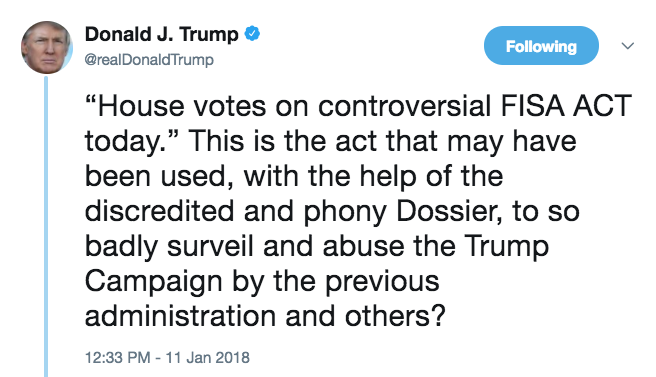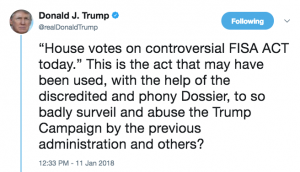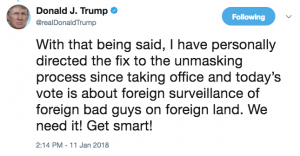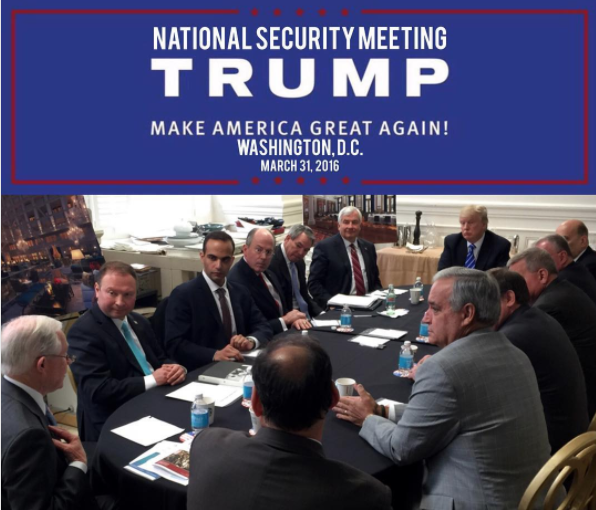In this post, I laid out the latest attempt from one-time Trump and current Aras Agalarov lawyer Scott Balber to craft an unincriminating story for the June 9 Trump Tower meeting. In general, Balber has gone to great lengths to provide innocent explanations for digital tracks suggesting the meeting was incriminating, and especially to deny that Agalarov — who orchestrated the meeting — had any direction from Putin.
In this post, I’m going to look at what Natalia Veselnitskaya (who, as I’ve noted, met with Balber sometime before October, which is where the documents she admits to first got introduced to the public) wrote in her statement to Chuck Grassley back in November, because she makes some really interesting dodges.
To start with, Veselnitskaya defines certain things so as to be able to deny certain relationships.
First, she distinguishes between Glenn Simpson and Fusion, admitting to a relationship with the former but not the latter.
I did not work with Fusion GPS, I know Glenn R. Simpson, whom since 2014 I have viewed as an individual investigator-analyst, a former investigative journalist with a long record of service and experience gained by a team of lawyers for point tasks that arose in connection with the preparation for trials, interrogations under case 13-civ-06326 the United States of America v. Prevezon Holdings Ltd. et al., initiated by Browder through the US Attorney’s Office with reference to my client. In my perception, it was Glenn R. Simpson who worked on the Prevezon Case, as to in what capacity – either as an individual or as a company – it was of no interest to me. I do not have any documents as to Fusion GPS.
[snip]
Glenn Simpson was hired by lawyers from Baker Hostetler, as well as other people who worked on the case. Some of them I have never even met. I used to receive reports from Glenn Simpson – CC-ed on all the lawyers working on the case.
[snip]
I didn’t work with Fusion GPS. In my study, analysis and documents I partly used the information obtained in December 2014 from Glenn Simpson within the scope of his services on legal research of Browder’s corporate relations, and his links to the United States, to serve a subpoena on him.
Importantly, she denies a claim made by Fox to have met with Simpson before and after the June 9 meeting.
So, on June 8, in the evening, I arrived in New York. On June 9, I attended the second district court hearing on Browder’s complaint and worked on some other issues. On June 10, I went to Washington to coordinate our position with our key lawyer in Washington.
[snip]
No, there had been no contacts with him on specified dates. Last week Fox News 38 referring to a confidential source reported that I met with Glenn Simpson before and after the meeting with Trump’s son, and that “but hours before the Trump Tower meeting on June 9, 2016, Fusion co-founder and ex-Wall Street Journal reporter Glenn Simpson was with Veselnitskaya in a Manhattan federal courtroom, in a hearing on the DOJ’s claim against Prevezon Holdings, a Cyprus company owned by a Russian businessman Denis Katsyv.” This statement does not reflect the reality.
[snip]
I met Glenn Simpson on the as-needed basis, as well as whenever he came to the office to see the lawyers.
The distinction may have the primary function of divorcing her relationship with (and the presence at the meeting of) Rinat Akhmetshin from Fusion and the Christopher Steele dossier. She claims that Akhmetshin’s presence at the meeting was tied to his role in an anti-Magnitsky NGO, with no involvement of Prevezon attorneys Baker Hostetler.
If the question is how he was introduced at the meeting on June 9, then as a consultant of the Human Rights Fund for relations with Congress.
This seems inconsistent with her reference to his having an NDA with her — who is the NDA with?
Most incredibly, Veselnitskaya distinguishes between meeting with Don Jr — a friend of a friend, she explains it as — and the Trump campaign.
Meeting on June 9, 2016, was not a “meeting with the Trump campaign”. My understanding is, this was to have been a private meeting with Donald Trump, Jr., – a friend of my good acquaintance’s son on the matter of assisting me or my colleagues in informing the Congress members as to the criminal nature of manipulation and interference with the legislative activities of the US Congress.
[snip]
No [she did not have advance knowledge of the other attendees], except for those people who had come with me and the person I was going to (Trump, Jr.), I did not have the slightest idea that someone else would be present at the meeting.
[snip]
No. I did not meet with the “Trump campaign”. At the meeting with Donald Trump, Jr. I had a reference in my own handwriting (see Exhibit 1.1), which I was ready to leave to Mr. Trump, Jr., should he need it. But to offer or provide this information was pointless, because as I understood during the meeting, Mr. Trump, Jr. was not at all aware of my request and could not help me at all.
Having done that, Veselnitskaya is in a position to deny knowing certain things: any involvement in tampering with the election and any tie to the Fusion dossier.
The additions she makes to three responses reinforce this focus. First, when asked whether she has any information on the Russian influence operation, to which she says, “Nor do I know anyone who would be in possession of such documents or knew about something like that.” She also doesn’t know who in the Russian government would know of her involvement. “Not that I know about. If so, who? Why were they briefed? What was their role?” And whether she knows Christopher Steele, to which she responds, “I do not know Christopher Steele. I first heard of him from US media.”
With that frame, here’s how Veselnitskaya explains the genesis of her meeting.
I had never asked anyone for a meeting with the Trump team.
Nor did I ask to organize namely a meeting with Donald Trump, Jr., it was enough for me to hand over a reference outlining the request (see Exhibit 1.1). Around the end of May 2016, during a conversation with a good acquaintance of mine, being my client, Aras Agalarov on a topic that was not related to the United States, I shared the story faced when defending another client, Denis Katsyv, about how terribly misled the US Congress had been by the tax defrauder William Browder, convicted in Russia, who, through his lobbyists and his close-minded rank-and-file Congress staffers, succeeded in adopting the Act in the name of a person whom Browder practically hardly ever knew.
I considered it my duty to inform the Congress people about it and asked Mr. Agalarov if there was any possibility of helping me or my colleagues to do this. I do not remember who of us was struck by the idea that maybe his son could talk about this with Donald Trump, Jr., who, although a businessman, was sure to have some acquaintances among Congress people. After my conversation with Mr. Agalarov, I prepared a reference in case it would be necessary to hand over the request – to support the hearings in the Subcommittee in the US House Committee on Foreign Affairs as to the Magnitsky’s and Browder’s story, scheduled for mid-June. I was ready to hand over the reference, talk on the phone, or meet personally.
Note, later in her answers, she claims to guard client confidentiality closely, even beyond things covered by privilege. But here, she claims to have discussed Katsyv’s plight with Agalarov.
And even though Aras Agalarov was crucial to organizing this meeting, Veselnitskaya claims to have no knowledge of any other involvement he had (which is something Balber has been trying to reinforce throughout).
All I know is that Aras Agalarov asked his son Emin Agalarov to enquire if Donald Trump, Jr. could help with my request. I am not aware of any further actions of Emin.
In the passage above, note how she obscures whether the Magnitsky/Ziff document released publicly (a report Putin parroted on October 19) got written in advance for the meeting or to lobby Congress with. Curiously, in this day of digital creation, she claims she doesn’t know precisely what day she drafted it (even thought the publicly released copy is dated May 31 on the Russian version).
A note about the meeting that I prepared in Moscow on or about May 31, 2016 for its possible handover to any interested party
That claim is critical given that — in a previous Scott Balber installment — the preexistence of this document involved an exchange between Veselnitskaya and the Prosecutor General, Yuri Chaika, offered up to explain why Rob Goldstone told Don Jr she had a tie to the Crown Prosecutor. She denies he had any involvement in the meeting and in he descriptions of involvement with him doesn’t describe the report.
I have no relationship with Mr. Chaika, his representatives, and institutions, other than those related to my professional functions of a lawyer. As a lawyer of Denis Katsyv, since 2013 I have sent several appeals to the Russian Federation General Prosecutor’s Office requesting documents within my legal powers, and also filed applications to verify the information about Mr. Browder’s activities in Russia that resulted in the wrongful seizure of my client’s assets in the USA and Switzerland, received answers, analyzed them and addressed them anew, should I be refused answers or provision of documents – I appealed to the court.
That’s important because she can offer no explanation for the reference, in Rob Goldstone’s email to Don Jr, to the Crown Prosecutor.
I do not know what Mr. Goldstone was talking about. Given what I know, I can assume that Mr. Agalarov might tell him a little about me, mentioning that I had previously worked in the prosecutor’s office, and the information I wanted to tell in the US Congress had also been reported by me before to the General Prosecutor’s Office of Russia and it was confirmed there. Having compiled this, the musical producer (as I learnt more than a year later) could either confuse everything, or intentionally make everything look intriguing so that the meeting could take place.
Another timing detail, Veselnitskaya denies remembering when she learned the meeting for which she claims to have made handouts would be a meeting, though she claims it was after she arrived in the US.
I do not remember from whom and at what time I first heard that I could personally express my request (see Exhibit 1.1) during at the meeting.
[snip]
I do not remember the moment when I first heard that I could personally make my request during a meeting. Nor do I exactly remember who told me about it. But upon arrival in New York in the evening of June 8, 2016, in my e-mail box I found a letter from a certain Goldstone, who notified me of the time and place of the meeting with Donald Trump, Jr. In this correspondence Aras Agalarov’s colleague, Irakli Kaveladze, who had been living in the United States for a long time and to whom I left my mail for contacts, was mentioned in the copy.
[snip]
I do not remember discussing it with anyone before I found out that there would be a meeting. This was an alternative way of communicating the request and I did not insist on a meeting. The day I was told that I would be met by Trump, Jr. (everything that I was able to restore in my memory, confirmed by mail from Goldstone – this could take place when I was already in New York), I informed Denis Katsyv about this.
This description raises real questions about Ike Kaveladze. Here’s the email Veselnitskaya said she received when she landed; note that, as publicly released, the reference to Kaveladze has been hidden, though it may be what the reference to “both” is. Note, the shift of the meeting from 3 to 4 is also not included in the email chain; Goldstone learned the change needed to be made by 10:34AM on June 8.
The apparently obscured reference to Kaveladze is particularly interesting given how she describes inviting Samochernov to attend as her translator on the morning of the meeting.
On the day of the meeting – June 9, I asked my interpreter – Anatoly Samochernov, and my colleague who had previously worked on the Prevezon Case – Rinat Akhmetshin, who was also a registered lobbyist for the Human Rights Accountability Global Initiative Foundation (HRAGI), and dealt with issues on behalf of the Foundation in the US Congress, which I planned to talk about at the meeting with Donald Trump, Jr. Both are US citizens. I informed Goldstone about them on June 9, which is confirmed by my correspondence.
Akhmetshin was reportedly in NYC for a theater production, but she apparently learned he’d be in town by 9:24.
Rinat Akhmetshin, who arrived that day in New York for an evening performance of Russian theatre stars.
Her description of Kaveladze’s role (remember, he’s represented by Balber) is particularly curious, in that she admits he was ostensibly there to serve as translator, which was unneeded since she had brought her own.
[She and Kaveladze] got acquainted first by phone when I was in Moscow. I met him personally first on June 9 shortly before the meeting.
[snip]
We had a phone call and met at a café, I do not remember where and at what café. I told him briefly what I knew about the Browder case, about the Ziffs and their possible support when lobbying his interests in the United States.
[snip]
I can suppose, he attended the meeting as a translator, however, as I was with a translator he was just sitting and listening.
The curious silences about Kaveladze are all the more interesting given that, unlike Veselnitskaya, he knew that Manafort and Kushner would be there and that dirt on Hillary would be dealt. And based on that description, he flew to NYC from LA.
Curiously, Veselnitskaya says neither Paul Manafort nor Jared Kushner were introduced at the meeting.
I came to the meeting with Anatoly Samochornov, a translator, Irakly Kaveladze, a lawyer of my client who helped to arrange for the meeting, Rinat Akhmetshin, my colleague who was working with me on the Prevezon case. We were met by a big, stout man who introduced himself as Rob and escorted us on the elevator to the boardroom. I saw two men in the boardroom – one of them introduced himself as Donald Trump Jr., while the other did not introduce himself. Another young man entered the boardroom a little later and left it shortly afterwards. I found out much later that the two unidentified gentlemen were P. Manafort and J. Kushner.
Laying all this out, it’s not so much that it doesn’t make sense (though there are clear gaps).
It’s that even with all of Scott Balber’s efforts, there’s still no explanation for why Kaveladze attended this meeting. Given Balber’s significant efforts to minimize Agalarov’s role in the meeting — and his denials that Agalarov might have ties directly to Putin — I find the failure to explain that notable.










